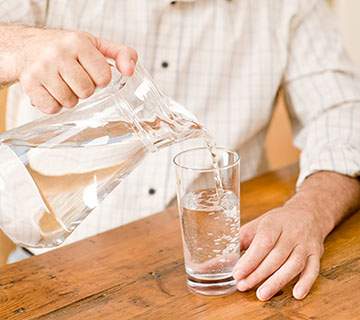Hydrate to Stay Healthy

No matter the season, staying hydrated is an important part of being healthy. And it’s especially important for your heart.
Keeping your body hydrated helps your heart more easily pump blood through your blood vessels to your muscles. According to sports medicine physician John Batson, MD, being well hydrated means your heart doesn’t have to work as hard.
Dehydration is a serious condition that can lead to problems ranging from swollen feet and a headache to something life-threatening like heat stroke.
The amount of water you need to stay hydrated depends on the climate, the type of clothing you have on and the intensity and duration of your exercise. Here are some things to consider:
- A person who perspires heavily will need to drink more than someone who doesn’t
- Certain medical conditions such as diabetes and heart disease may mean you need to drink more water
- People with cystic fibrosis have high concentrations of sodium in their sweat and need to be extra cautious not to get dehydrated
- Some medications can act as diuretics, causing your body to lose more fluid than normal
The best indicator that you need to drink more isn’t thirst. “If you get thirsty, you’re already dehydrated,” Baston says. Instead, the easiest indicator is the color of your urine: pale and clear means you’re hydrated; dark means you need to drink more water, which is the best drink to keep you hydrated.
“It’s healthier to drink water while you’re exercising, and then when you’re done, eat a healthy snack like orange slices, bananas or a small handful of unsalted nuts,” Batson says. He also warns again drinking fruit juice or sugary sodas, and it’s best to avoid drinks with caffeine as these can act as diuretics.
Staying hydrated isn’t only important during physical activity. Just sitting in the sun on a hot or humid day can cause your body to need more fluids. And anyone with a heart condition, older than 50 or overweight should take extra precautions.
Remember to check with your healthcare provider before starting any exercise program.
